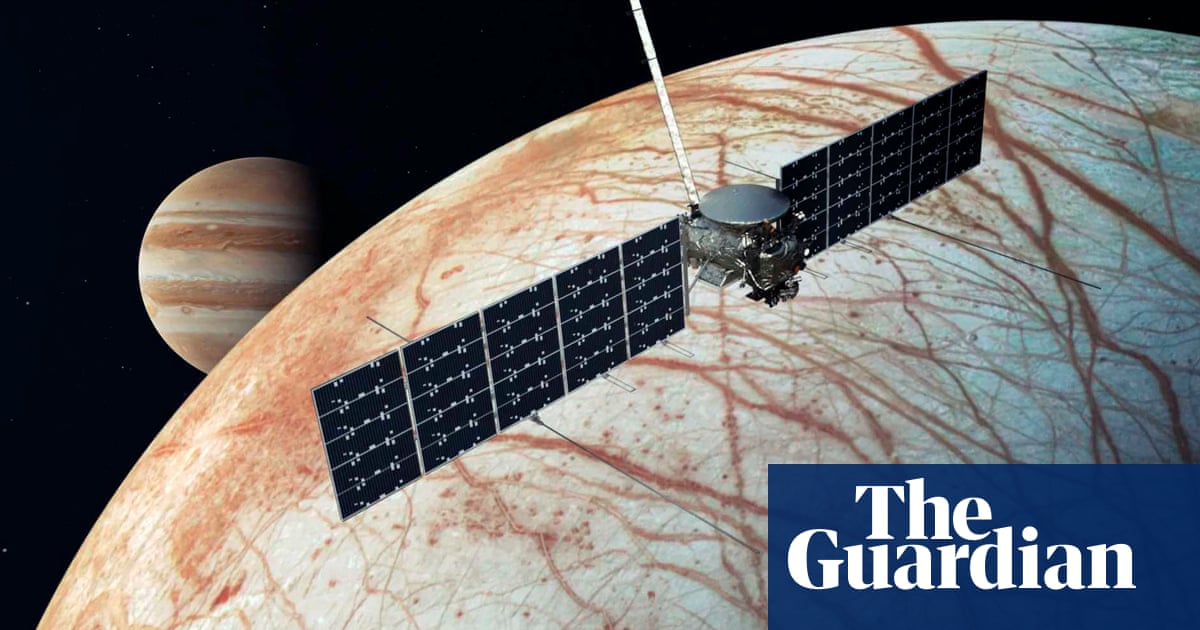
Europa Clipper to blast off on mission to find out if Jupiter moon may hold life
Nasa is poised to send a spacecraft to a frosty moon of Jupiter where extraterrestrial life may eke out an existence in an enormous ocean hidden beneath its ice-covered surface.
The Europa Clipper mission is due to blast off from Kennedy Space Center in Florida at 12.06pm local time on Monday after the original plan to launch on Thursday was scrapped due to the battering winds brought by Hurricane Milton.
Barring any further snags, the six-ton spacecraft ? the largest Nasa has ever built for a planetary mission ? will fly past Mars and swing back around Earth before slingshotting out to Jupiter, covering nearly 2bn miles before reaching its destination in 2030.
While the $5bn (?3.8bn) mission will not look for life itself on the frigid Jovian moon, the probe?s suite of instruments will scour Europa?s surface for fingerprints of organic compounds and sniff for gases released from the moon to assess whether it is habitable.
?It?s a chance for us to explore not a world that might have been habitable billions of years ago but a world that might be habitable today, right now,? said Curt Niebur, a programme scientist on the mission.
The spacecraft measures more than 100ft from end to end, largely because of the super-sized solar panels needed to generate enough power for the probe?s electrical systems so far from the sun. It carries nine instruments including cameras to map the moon?s surface and radar to peer beneath the moon?s thick ice covering.
Previous observations of Europa have revealed giant plumes of water spraying from its frosty surface, and tantalising evidence for an 80-mile-deep subterranean ocean that holds twice as much saltwater as Earth beneath a 10 to 15 mile-thick layer of ice. If life has emerged on the Jovian moon, which is a similar size to Earth?s moon, telltale compounds may lurk in the water spewed out.
Beyond the routine perils of launch, the spacecraft faces extreme, and potentially computer-frying, levels of radiation once it embarks on its observations of Europa. Jupiter is surrounded by an enormous magnetic field that whips up charged particles and slams them into Europa. The intense radiation bathes any spacecraft that attempts to fly around the body.
For protection, Europa Clipper?s sensitive electronics are housed in an aluminium-shielded vault, and instead of going into orbit around Europa itself, it will circle Jupiter, from where it will perform 49 looping flybys of the moon, one every few weeks.
Despite limiting the amount of time the spacecraft spends in Europa?s most intense radiation field, each flyby, which will last less than a day, will still expose the probe to the equivalent radiation of 1m chest X-rays.
For all the damage it can cause, the radiation may produce fuel for life. If the high-energy particles split water molecules into oxygen and hydrogen in Europa?s thin atmosphere, some oxygen may reach the ocean and react with other chemicals to provide energy for alien microbes.
?If you think of all the water here on Earth, and then double it, that?s how much water we think might be on Europa,? said Dr Caroline Harper, the head of space science at the UK Space Agency. ?Water is essential for life as we know it, and if we are going to find life elsewhere in the solar system, it?s very likely to be on an icy moon like this. The Europa Clipper mission will seek to discover if Europa is a habitable place that could support life in the huge ocean under its icy surface.?
The UK Space Agency has invested ?9m in science instruments on another mission to the Jupiter system, Esa?s Juice probe, which is due to arrive at the gas giant in 2031. The Juice mission and Europa Clipper will work together to study Jupiter and its moons.
?It?s exciting to think that within the next decade we could have definitive scientific proof of the potential for habitable worlds beyond our planet,? Harper said.






